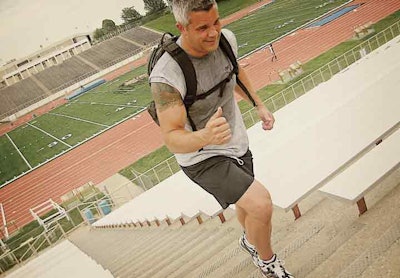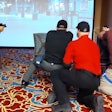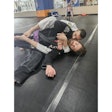 Photo courtesy of Jeff Baker.
Photo courtesy of Jeff Baker.
Familiar explanations for not exercising include: not enough time, results don't come quickly enough, I've got kids at home, I'm tired, and the gym costs too much money. Well, what if instead of labeling those as shabby excuses not to get fit, I agree with you for the moment and suggest your sentiments are understandable?
Our lives brim full with activities. A law enforcement career creates unique demands on both the individual officer and his or her family. Shift work and having to log weekends and holidays adds to the dilemma, as do parent-teacher conferences, kids' baseball games, part-time jobs, home maintenance, and other forces that compete for our time. But that doesn't mean you're off the hook.
Self Examination
I'm going to be blunt. Do you reason that only cops working the "bad" part of the city need to train? Think again. We average a staggering 57,000 assaults on officers in this nation every year. Oh, and small-town cops? They die too. How about you investigators? The fact you're on a desk and wear a suit is no guarantee. A detective and longtime friend once had his eye closed by a 250-pound rhinoceros of a man with anvils for fists in an out-of-the-blue attack during an interview.
OK, these statements may only serve to demonstrate my mastery of the obvious. You're already aware that dealing with the criminal element for a living carries with it inherent risks, but have you stopped to consider the danger you may pose to yourself and, by extension, your brothers and sisters around you?
If one eliminates vehicle-related fatalities and those officers lost annually in shootings, the leading cause of line-of-duty death over the last decade is "Job-Related Illness," this according to the National Law Enforcement Memorial Foundation. That's code speak for cardiac or respiratory arrest.
Nope, not on my watch you don't.
The plan here is to introduce a Monday-Wednesday-Friday exercise regimen that is unique, fast (sub-30 minutes each), and cheap. Do as you read here for six weeks and you'll be nothing less than shocked at the level of strength and conditioning you attain with so little time invested in each workout.
What I'll describe isn't a technical walk-through, but the basic tenets of the program and how to source necessary equipment and gear. As a preamble, I assume you'll take a few minutes to warm up before training and that you'll hydrate properly before, during, and after the workouts. And don't forget a post-workout meal. A small protein shake and piece of fruit or other simple carbohydrate source is what I prefer.
These are ideas I've introduced at my precinct without spending a dime of my own money or departmental funds. So tighten your chin strap. This is fun, unorthodox work.
The Terrible Tire
When patrolling downtown one afternoon, I noticed a stockpile of weathered heavy equipment rubber in a tire yard. I introduced myself to the manager and asked if he had anything lying around that might be destined for disposal. It costs good money to destroy unserviceable used tires, and he was more than happy to donate and deliver a couple to our precinct.
Note: You may want to seek your administration's blessing before soliciting such a donation, but this "gift" wasn't a gratuity in nature and most business owners are eager to help their public servants with no expectation of special treatment.
Look for a tire in the range of 150% to 200% of your body weight. The tire I'm working with these days is around 427 pounds, but I weigh 240 and am hoisting only a portion of the tire's mass at any given time in the movement.
Here's the technique: Squat deeply, hands inside the feet, forearms flat against the tread, maintain a neutral lumbar, and let your legs do the work. When you get beyond 45 degrees, the tire will tend to right itself; release your underhand grip and forcefully check the tire away with open palms before chasing it for another rep. Work dynamically. If it's too difficult to do a continuous set of 10‒12 repetitions, get a lighter tire rather than reducing reps.
For added challenge between sets, beat the tire with alternating overhand sledgehammer strikes. I signed one out of our property room for this purpose. Again, this requires no cost but reaps huge dividends. This movement works the core and shoulders while keeping your heart rate up between sets, and it activates the same muscle group that's involved if throwing overhand hard-empty-hand control techniques when top-mounting an actively aggressive suspect.
Don't be discouraged early on; the results will come. The first time I trained this way, I could muster only 25‒30 reps before exhaustion. Nowadays, I regularly do upward of 130 repetitions on tire day.
Weighted Stadium Stairs
Few if any junior highs or high schools limit access to their football field or the running track around it. Take advantage of this golden opportunity to engage in free, outdoor calorie burning.
You can get a good stair workout without a weighted vest or ballast-filled backpack, but I prefer one to up the intensity and shorten my time commitment. Depending on the poundage chosen, this training will pose a challenge to both novice and high-level athlete alike. I used a pair of 35-pound plates borrowed from the precinct weight room for a portion of the workout depicted in the photos, but an industrious officer can use just about anything around the house: phone books, soup cans, or a few bricks from the garage will do.
Walk, don't run the stairs; you'll tire too quickly otherwise. Vary how many steps you take with each stride. Hitting every step and keeping your weight on the balls of your feet will place an emphasis on the calves; striding out and hitting every other step is more difficult and works larger muscle groups in the quads and glutes. Try both.
Go up, across, and down, then back up again—so as to eventually work the whole side of the stadium like a ladder. Simply walk the stairs without stopping for 30 minutes or, early on, for as long as you're able. You'll gas quickly at first, but again, stay the course. Things will get better.
100-Yard Sprints
Any high-intensity exercise burns calories, but precious little fans the flames of the metabolism like sprint work does. Aside from how effective sprints are at whipping you into shape, there is real-world practicality for the police officer doing this type of exercise. Ever seen an overweight sprinter? Neither have I. They're lean and well-muscled—hardly the build of their oftentimes emaciated counterparts in the world of distance running.
There are myriad sprint conditioning workout examples you can find on the Web, so it's not my goal to codify one peculiar to you. But I'll tell you what I do after a warm-up and a few relaxed sprints at 50 percent: 8‒10 full-tilt 100-yard sprints, as hard as I can possibly go, with 2-minute recovery periods in between. That's it. By the final two or three sprints I'm moving slow and pondering my considerable discomfort, but it's worth it. We're talking about a total body workout that takes under a half-hour to accomplish.
You will experience delayed onset muscle soreness 24‒48 hours after this workout; that's simply a byproduct of taxing your body in a way it's not acclimated to. Allow for some time to get past the soreness.
The Payoff
Yes, I do traditional strength training, too. I don't smoke and I try to eat fairly well. Yet I'm not a gifted athlete who gets by on good genetics. I'm a 44-year-old asthmatic who has to work for it.
Despite enthusiasm for exercise and my having led a generally healthy lifestyle for years, if I had no money for a gym membership and only 60‒90 total workout minutes available per week, I'd do the tire/stair/sprint routine in perpetuity and know I would be stronger and better conditioned than almost anyone I encounter on the street. The trio is that effective.
Here's where I brush up against sanctimony: anyone can find 20‒30 minutes three times a week. These workouts cost no money. They're different enough from the typical grind that you'll find them fresh and entertaining, really. They're hard and you'll be sore, but if you find yourself wanting to quit, consider this: according to researchers, as few as six minutes of punishing exercise per week could be as effective as an hour of daily moderate activity.
The payoff of investing in yourself is far reaching for mind and body. You'll experience better sleep, a heightened sense of well-being, clothes that fit, respect from your peers, enhanced longevity moving toward retirement, and the ability to defend yourself and carry out your duties when the moment of truth arrives.
It's coming, you know...
Are you ready?
"We don't rise to the level of our expectations, we fall to the level of our training."—Archilochus, Greek Soldier, Poet, c. 650 BC
Sgt. Jeff Baker is a decorated veteran of the Omaha Police Department. A law enforcement officer since 1988, Baker is a Federal Law Enforcement Training Accreditation (FLETA) certified police instructor.














